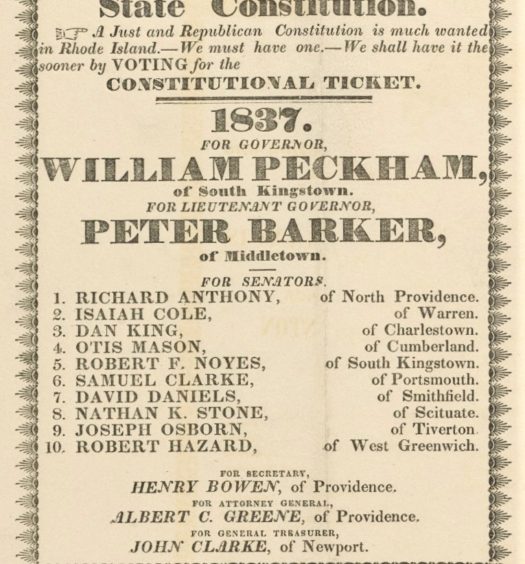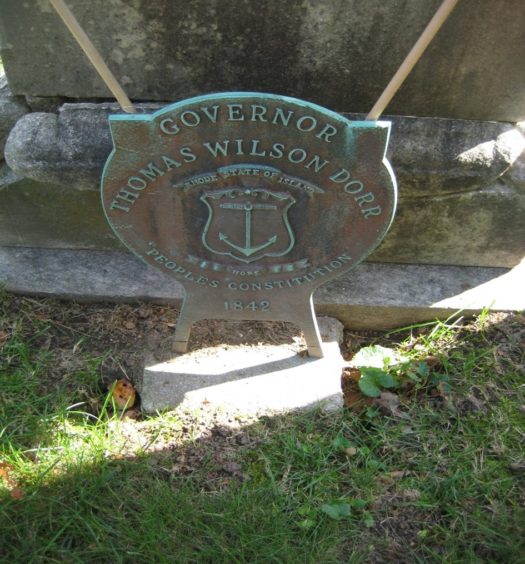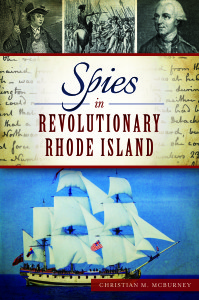Peter Gerry, a former U.S. Senator from Rhode Island, is back in the news. This is surprising because he is now almost forgotten in Rhode Island’s history, despite his being a leading figure in state politics in the first half of the twentieth century.
This is how I became aware that Gerry is now the talk of political pundits. Eight days before the 2016 election day, a well-known and respected political pundit discovered the smallstatebighistory website and called me. He wanted to confirm how to pronounce Peter Gerry’s last name, and the last name of his opponent in the 1928 and 1934 U.S. Senate elections, Felix Hébert. The political pundit explained why. In 2010, Republican Ron Johnson defeated the then sitting U.S. Senator from Wisconsin, Russ Feingold. Feingold, in this 2016 election cycle, is the Democratic nominee for the same U.S. Senate seat and is challenging Johnson. The race is close, but Feingold has the edge, according to polls. If Feingold wins, he would become only the second senator in history to reclaim his seat in a rematch by popular vote. The first and only time that occurred was in 1934, when Peter Gerry, who lost his reelection bid in 1928, came back to defeat Senator Hébert in 1934.
Finding out how to pronounce Gerry’s and Hébert’s names properly was surprisingly difficult. Peter Gerry was the great grandson of Elbridge Gerry who was a signer of the Declaration of Independence from Massachusetts and the Vice President of the United States under President James Madison. Elbridge Gerry is best known for having given his name to gerrymandering, the terribly anti-democratic strategy of carving up election districts, often into unusual shapes, with the goal of concentrating the voting strength of the opposing party into as few voting districts as possible. The term gerrymandering is pronounced with a soft “g.” It turns out that the Gerry name is pronounced with a hard “g,” and is pronounced like the common first name of Gary. In an interview, a descendant of Elbridge Gerry and relative of Peter Gerry complained that the Gerry family had been trying to correct the mistake for years, but had been so far unsuccessful.
I have not been able to determine how the last name of Felix Hébert, a French-Canadian born in Quebec of American parents who later moved to West Warwick, was pronounced by him. For two reasons I believe it was the classic French pronunciation, “ay-bear” (silent h and t). First, being born in Quebec and with his parents moving to Rhode Island after his birth, it seems likely the family stuck with the French pronunciation. Second, his Congressional biography spells his name with the accent over the first e (which I have adopted in this article, although Rhode Island newspapers did not do this). Using this accent suggests he continued to use the classic French pronunciation of his name. By contrast, today, in West Warwick and elsewhere where there are concentrations of French-Canadians in New England, the name Hebert appears without the accent and is pronounced “he-burt.” In addition, one Rhode Island historian informed me that Felix’s last name was pronounced “he-bear,” which is a mishmash of English and French pronunciations.
Peter Goelet Gerry was born in New York City on September 18, 1879, the son of a wealthy family with extensive real estate holdings in New York City. After graduating from Harvard University in 1901, he studied law and was admitted to the Rhode Island bar in 1906. In 1910, he married Mathilde Townshend, a wealthy Washington, D.C. socialite.
The Gerrys made their home in Newport. The wealthy and fashionable Gerrys were comfortable in Newport’s elite society. Gerry’s father for years had owned and occupied as a summer residence the mansion called Seaverge, near the south end of Bellevue Avenue (it was demolished in 1956). Gerry’s sister-in-law was the sister of John Nicholas Brown.
Peter Gerry was less interested in practicing law than politics. Elected to the Newport Representative Council in 1911, Gerry ran successfully for Congress the next year from the state’s Second District, even though he lived in Newport in the Second District. (Gerry did buy a second house in Warwick in the Second District). Rhode Island was predominantly a Republican state at the time, but he won election to Congress when the national Republican Party was torn asunder by the bitter fight between incumbent President William Howard Taft and former President Theodore Roosevelt. In the election of 1912, which vaulted Democrat Woodrow Wilson to the presidency, Gerry edged his Republican rival by a scant 393 votes.
Gerry served only one term in the House of Representatives, after the Republican Party again united for the 1914 elections. Despite his defeat, Gerry declared his intention to remain in politics and spent freely to entertain those Democrats who had to be cultivated. Republicans accused millionaire Peter Gerry of “financing the Democratic campaign.”
Gerry ran for the U.S. Senate in 1916. In a major upset, he defeated incumbent Republican Senator Henry F. Lippett, thus becoming the first Democratic senator from Rhode Island since 1859. Gerry was also the first U.S. Senator from Rhode Island elected by popular vote rather than by the state senate. And he was the youngest man ever to have been elected to the U.S. Senate at that time. In 1922, Gerry was re-elected to the Senate by almost 14,000 votes.
From 1919 to 1929, Gerry was the Democratic whip of the U.S. Senate. A Wilsonian Democrat, he was an idealistic supporter of President Wilson’s proposal of a League of Nations.
Gerry purchased the Providence News in 1921. Owning a newspaper gave him a valuable pulpit to support his budding political career. in 1929 he acquired the Providence Tribune and merged the two newspapers, calling it the News-Tribune. He sold the newspaper in 1937 to Walter E. O’Hara, founder of the Narraganset Race Track. The paper went out of existence several years later.
In 1925 Gerry made some dramatic changes in his personal life. First, in Paris, he divorced his first wife, Mathilde. Then, on October 22, 1925, in London, he married Edith Stuyvesant Vanderbilt, who was six years younger than him. Edith’s first husband was George W. Vanderbilt II, the owner of the Biltmore Estate in Asheville, North Carolina, which remains the largest privately owned residence in the United States. The grandson of Commodore Cornelius Vanderbilt, George Vanderbilt’s father, William, was the country’s richest man at the time of his death in 1896 with a fortune of almost $200 million dollars, the equivalent of more than $5 billion in today’s currency. After George Vanderbilt’s untimely death from heart failure at the age of fifty-one in 1914, Edith sold the land around the Biltmore Estate to the U.S. Forest Service, which later became the Pisgah National Forest. The couple had one daughter, Cornelia. Under George Vanderbilt’s will, the bulk of his estate went to his daughter, Cornelia. Edith was born in Newport and had spent part of her childhood there.
In 1928 Gerry was surprisingly defeated by Republican Felix Hébert by a plurality of almost 3,000 votes. The two-term senator lost his re-election bid by 51 percent to 49 percent. The year 1928 nationally was a strong one for the Republican Party, which picked up eight Senate seats and the White House. In Rhode Island, the Republicans remained in control of the state legislature. Perhaps Gerry’s divorce, which was then not common for politicians, also played a role in his loss. Hébert, from West Warwick, drew the support of French-Canadians, the state’s largest ethnic voting bloc.
Gerry longed to return to the Senate, but he had to bide his time. He tried to make a political comeback in 1930, challenging Rhode Island’s other Republican senator, Jesse H. Metcalf. Both Metcalf and Gerry owned significant interests in newspapers in Providence—Metcalf the Providence Journal. Furthermore, both men spent freely from their personal funds for their respective campaigns. Gerry shrewdly employed as his chief of staff James A. Byrn, a clever Irish-American who thoroughly understood the rough and tumble of Rhode Island politics.
In the 1930 campaign, from his desk at the News-Tribune, which he ran as his official press, Gerry sent a number of checks to the Democratic Party, ostensibly to help the party registration drives in various towns and cities. Indeed, Gerry contributed over $13,000 to the party for the “work of registration.” How much of this was used for registration and how much found its way into the pockets of key personnel of the party one never knew. In addition, Gerry sent a $1,000 check, earmarked especially for the town of Warren. Besides the large amounts of “registration” money Gerry had contributed before the state convention, the Gerry family contributed more than $50,000. Metcalf had a point when he complained that the Democratic Party was indebted to the “Gerry money machine.”
The biggest campaign event took place in October 1930 when the 1928 nominee for President of the United States and former governor of New York, Al Smith, journeyed to Rhode Island to make his first major political appearance outside New York after a long while. Smith was a personal friend of Gerry, whose family maintained extensive real estate holdings in New York City, and while in Rhode Island he stayed at Gerry’s home. As the first Roman Catholic and Irish-American to be nominated to be a major political party’s standard bearer for President, Smith was popular in Rhode Island. Smith lost to Hoover in the 1928 presidential election, but he carried Rhode Island. A total of 16,000 people crowded Rhode Island Auditorium in Providence, and another 10,000 waited outside, as Smith tore into President Hoover and the national Republican Party for having promised false prosperity in the 1928 campaign and helping to bring on the Great Depression. Smith praised Rhode Island Democratic candidates, in particular, Peter Gerry. According to historian Erwin L. Levine, it was likely that “Smith was in Rhode Island for two reasons: he was pushing his own candidacy for the presidential nomination in 1932, and he was personally obligated to Gerry.”
Smith’s support did not translate to victory for Gerry. In the 1930 election, he lost his bid for the U.S. Senate by 2,515 votes, about the same as his margin of defeat in 1928. The Republican Party, meanwhile, in the state won absolute control of both houses of the state legislature.
Following his defeat, Gerry again kept a careful eye on political developments in Rhode Island. The Great Depression helped to transform politics and voting patterns in Rhode Island as much as any state in the country. The days of Republican Party domination of the state were numbered.
The 1932 election brought upon an important division between the state’s top two Democrats, Gerry and Theodore Francis Green. The two men had some similarities, in that both came from English stock, had money, and used savvy Irish pols as their chiefs of staff, but the similarities ended there. For one, Green was legendary for his frugality, almost always taking a street car to his government post, while Gerry employed a full staff to take care of himself and his wife. The two men would become rivals who did not much like each other.
Peter Gerry publicly endorsed Al Smith for President in 1932. Believing that Smith could not win, Green decided to declare his independence from Gerry. In the 1930 election, both Green and Gerry had gone down to defeat, even though they each had Smith’s personal support, Smith had campaigned for them in Rhode Island, and Smith himself had carried the state’s electoral votes. Green therefore decided to sever his public connection with Gerry. His judgement was that a new candidate, Franklin D. Roosevelt, now looked like too formidable to beat and the two men had a compatible political philosophy. After Green had reached out to the Roosevelt campaign during the Democratic Party Convention, Gerry’s relations with Green became especially cool.
Of course, Franklin Roosevelt was elected president in 1932 in a landslide. Green won the governorship in the same year.
Meanwhile, Gerry prepared to run for the U.S. Senate again against Felix Hébert. In the 1934 election, Gerry, riding for the most part on Roosevelt’s coattails, more than made up for the beating Hébert had given him in 1928 by carrying every city but Cranston and Warwick, as he swept to victory. Garry handily defeated Hébert, 57 percent to 43 percent. Gerry benefited by the fact that 1934 was a great year for the Democratic Party, which picked up nine seats during President Roosevelt’s first midterm elections.
In 1936, Theodore Green joined Gerry in the Senate when he defeated Senator Jesse H. Metcalf. Green tied himself closely to President Roosevelt, making an inspiring seconding speech for Roosevelt at the Democratic National Convention. At this point, Gerry finally decided to follow his true colors. Growing more conservative over the years, he was not as liberal as Roosevelt and Green and did not support much of the New Deal legislation. Gerry resigned as Democratic National Committeeman from Rhode Island during the Democratic National Convention and Green replaced him. In a radio address just before election day in Providence, Gerry supported state Democrats but omitted any mention of the New Deal or support of President Roosevelt for reelection.
In the U.S. Senate, Green loyally supported President Roosevelt, while Gerry did not. Green favored the Neutrality Act of 1936, Roosevelt’s attempt to push the country toward military preparedness while war loomed in Europe, but Gerry voted against it, believing that voting for it would make U.S. involvement in a war more likely. When later asked how he could be anti-British when Great Britain was in such danger from Nazi Germany, recalling his Boston heritage from the Revolutionary War, Gerry responded, “You perhaps won’t understand, but in families like mine we still remember the lobsterbacks.” The great litmus test for being a Roosevelt loyalist was supporting the president’s Supreme Court packing plan in 1937. Green backed Roosevelt, but Gerry opposed it.
According to Ray Hill, who wrote a good article on Gerry, “Gerry did support much of Roosevelt’s foreign policy, but his closest associates inside the Senate were men like Harry F. Byrd of Virginia and Josiah W. Bailey of North Carolina, both of whom were deeply conservative and hostile to much of the New Deal and Franklin Roosevelt personally. Senator Gerry, like many of his contemporaries, was more of a Wilsonian Democrat than a New Deal Democrat.”
Both Gerry and Green served on the Senate Naval Affairs Committee in 1940 and 1941. As a result, they were able to help bring the Naval Air Station to Quonset Point and the Seabee training school to Davisville. This meant more than 11,000 construction jobs for Rhode Islanders.
In 1940, Gerry, always eager to thwart Roosevelt, introduced legislation in the Senate to prevent any president from seeking a third term. In the 1940 elections, Roosevelt carried Rhode Island by an even greater margin than he had in 1932. Gerry was re-elected to the Senate, but Roosevelt ran 10,000 votes ahead of him. In December 1941, Gerry voted for declarations of war against Japan, Germany and Italy.
Gerry never became an influential Senator, in part, because his interrupted service kept him from attaining a committee chairmanship. In those days, powerful chairmanships were handed out based on seniority.
Gerry did not help his quest for influence by missing 29.1% of the roll call votes during his years of service (1,015 of 3,492 roll call votes). This was much worse than the median of 13.9% among the lifetime records of senators serving in August 1946.
As he aged, Gerry’s personal appearance, according to Ray Hill, “coincided with his chosen profession; he was well tailored and as he aged, he looked more and more like the popular conception of a Senator of the United States.” Hill wrote:
Not surprisingly, Peter and Edith Gerry were quite active in the social life of the Capitol. Senator and Mrs. Gerry maintained homes in Providence, Rhode Island, Washington, D. C., Asheville, North Carolina, New York City, and an estate in Lake Delaware, New York. Much of Senator’s Gerry’s wealth was tied up in real estate and the Gerry family owned considerable commercial property in New York. Edith Vanderbilt Gerry had not inherited the bulk of her first husband’s wealth, which had gone to her daughter, Cornelia. Senator and Mrs. Gerry constantly sold off property to meet expenses, as Peter Gerry found it impossible to maintain their lifestyle on a senator’s salary.
Hill added:
Personally, Gerry was courtly and kind to visitors and callers and while he had no children, nieces and nephews still remember him as an imposing man, although not an especially doting uncle. He had been unusually close to his brother Robert during their shared childhood, but over the years the two drifted apart. One of Robert’s nephews vividly recalls visiting his grandfather at his estate in Lake Delaware, New York, which adjoined that owned by his Uncle Peter. Robert and his grandson were out shooting and suddenly Senator Gerry appeared out of the woods and loudly complained, causing Robert to mutter under his breath, “I wish you’d shot the son-of-a-bitch!”
Peter Gerry did not seek reelection to the United States Senate in 1946 and while he was sixty-seven years old at the time, many of his colleagues continued running long after seventy. Gerry may have decided not to run due to the fact Rhode Island’s much younger and very ambitious Governor J. Howard McGrath was anxious to go to the Senate. Peter Gerry may have felt he didn’t care to go to the expense and effort of another campaign in what would be a very difficult primary campaign. Gerry’s retirement may also have had much to do with declining health.
Peter and Edith Gerry retired and continued to divide their time between various homes. Edith Vanderbilt Gerry is still remembered by Gerry family members as a charming and entertaining woman, even after suffering a serious stroke. Peter Gerry began suffering from dementia and died on October 31, 1957 at age seventy-eight. Oddly, he died within a few hours of the brother he had been so close to in his younger days.
Despite having served in Congress for twenty-six years and through some of our country’s most harrowing times, Peter G. Gerry is little remembered today, even in Rhode Island. The Providence airport is named for his longtime rival Theodore Francis Green; there is no similar memorial to Peter Gerry. The home Gerry shared with Edith Vanderbilt Gerry in Providence is now a gallery affiliated with the Rhode Island School of Design, a bequest of Edith Gerry.
Senator Gerry’s personal and political papers seemed to have disappeared following his death, which makes it even more difficult for historians to consider his career in Congress. Yet, during their time, Peter and Edith Gerry represented one of the ultimate “power couples” in Washington, D. C., as well as life in a different age.
Gerry set the stage for another Senator from Rhode Island, Claiborne Pell. Pell’s family was also wealthy and hailed from New York, and Pell moved to Newport. The two men circulated in similar elite circles. Like Gerry, the debonair Pell ran for the U.S. Senate and won. Pell was re-elected for five more terms.
Gerry, after passing away in Providence, was interred at St. James’ Churchyard in Hyde Park, New York (not too far from Roosevelt’s burial site). Gerry’s wife Edith passed away in Providence in 1958. In 2015, the Rhode Island School of Design exhibited her glamorous clothing from the 1920s and 1930s. The former home of the Gerrys, a New-Renaissance style home at 62 Prospect Street in Providence, was built in 1860 and at Edith’s death was given by bequest to the Rhode Island School of Design. It now serves as student gallery space on the ground level and the admissions office on the second floor.
[Banner Image: Peter Goelet Gerry and his wife, Mathilde, at a horse show, probably around 1914 (Library of Congress)]
Bibliography
“Gerry Omits Mention of New Deal in Talk,” Newport Mercury, Oct. 30, 1936.
Hill, Ray. “The Senator and Mrs. Vanderbilt: Senator Peter Gerry of Rhode Island.” The Knoxville Focus (April 29, 2013) [Knoxville, Tennessee]. Available by on-line search.
Levine, Erwin L. Theodore Francis Green, The Washington Years, 1937-1960 (Providence, RI: Brown University Press, 1971).
Levine, Erwin L. Theodore Francis Green, The Rhode Island Years, 1906-1936 (Providence, RI: Brown University Press, 1963).
“Peter G. Gerry, 78, Succumbs; Rhode Island Senator for 24 Years,” Newport Daily News, Oct. 31, 1957.
“Peter G. Gerry, Ex-Senator, Dies Hours Before His Brother Robert,” New York Times, Nov. 1, 1957.
O’Sullivan, Jim, “’Gerrymander’ Story Marked for Posterity with Downtown Boston Plaque,” Metro West Daily News, May 30, 2007. Available by on-line search.
Schlup, Leonard. “Wilsonian Moralist: Senator Peter G. Gerry and the Crusade for the League of Nations.” Rhode Island History, vol. 58 (Feb. 2000), pp. 23-33.

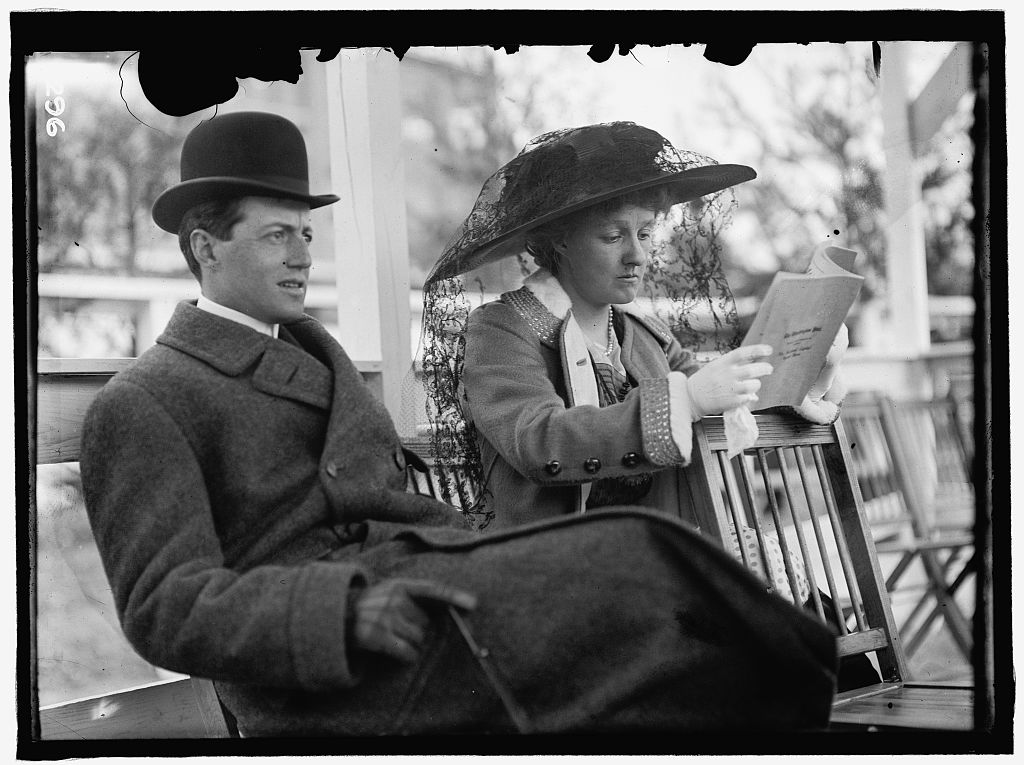

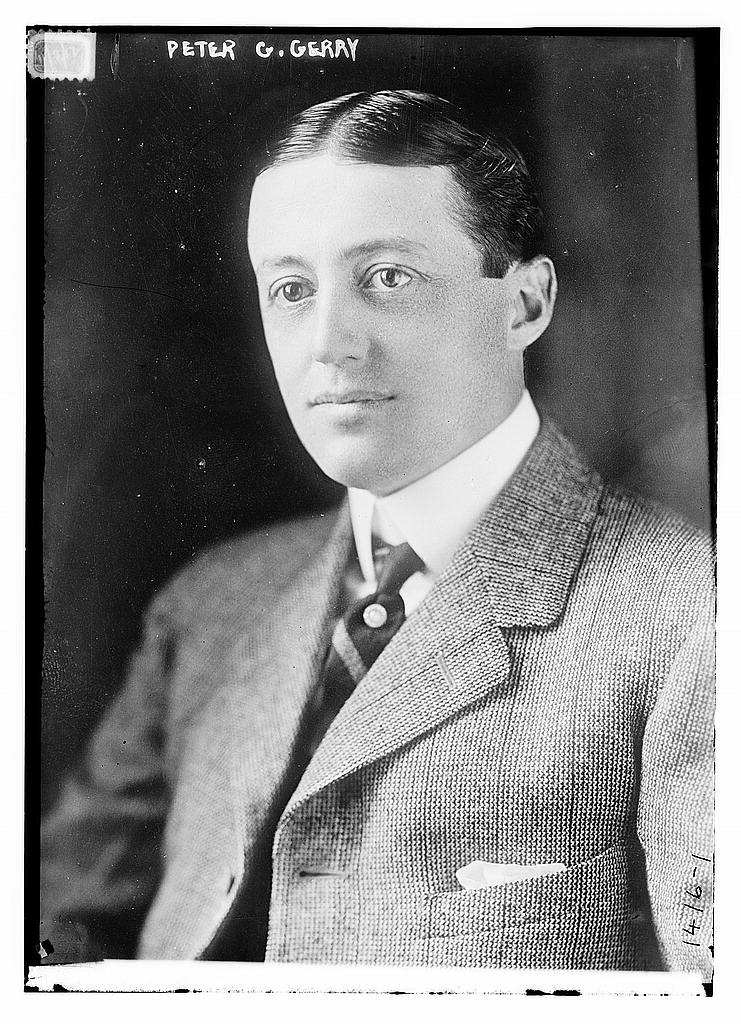

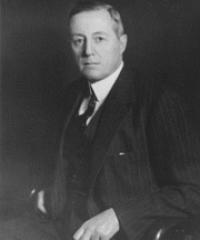
![U.S. Senator Peter G. Gerry, May 1940 (Library of Congress)]](http://smallstatebighistory.com/wp-content/uploads/2016/11/PeterGerrymay1940LOC.jpg)
